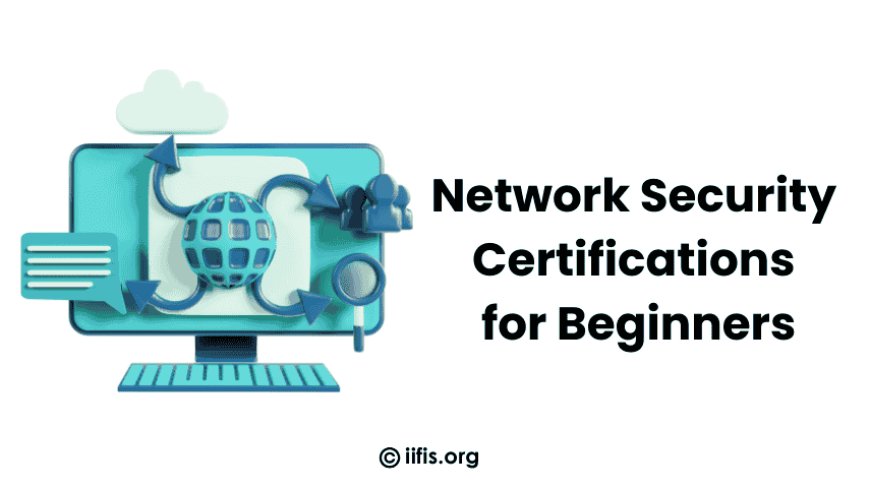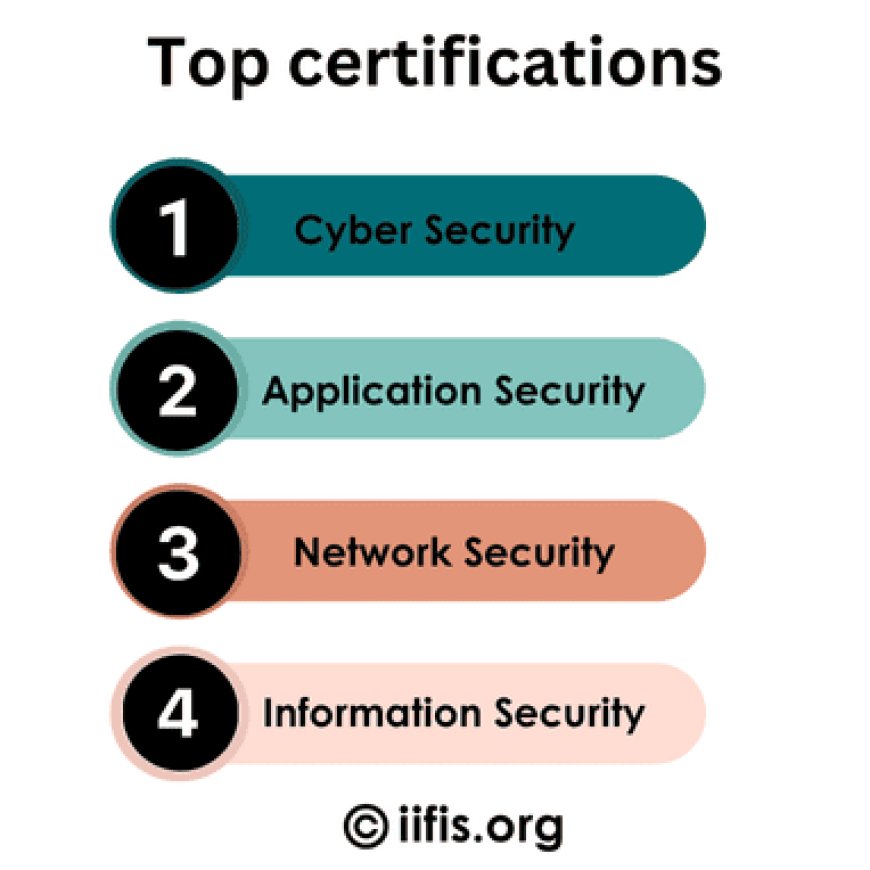Top Network Security Certifications for Beginners
Discover the top network security certifications for beginners to kickstart your cybersecurity career. Learn about the essential certifications that build foundational skills in protecting networks and securing data. Perfect for those new to the field!

The increasing dependence on technology in nearly every aspect of life has made cybersecurity an essential field. With businesses, governments, and individuals constantly facing threats like data breaches, hacking, and malware, securing networks has become a top priority. Network security plays a crucial role in protecting sensitive information and maintaining the integrity of systems. As a result, there’s a growing demand for skilled professionals to help safeguard these networks. For beginners interested in this field, certifications provide an excellent way to build foundational knowledge, prove their skills, and start a career in cybersecurity.
What is network security?
Network security works like a shield for computer systems, stopping harmful activities before they can cause damage. It uses different methods, like firewalls that block unwanted traffic, encryption that scrambles data so only the right people can read it, and antivirus software that detects and removes harmful programs. It also involves monitoring the network regularly to catch any unusual behavior that might signal a cyberattack. For example, if someone tries to log in without permission, network security measures will alert the system to stop them. Overall, network security ensures the safety of information while letting users do their work without interruptions.
Why Network Security Certifications Matter for Beginners
Network security certifications are important for beginners for several reasons:
-
Structured Learning Path: Certifications provide a clear roadmap for acquiring essential knowledge and skills in network security. They guide learners through foundational concepts and more advanced topics, making it easier to grasp complex ideas.
-
Industry Recognition: Earning a certification shows potential employers that you have a verified level of knowledge and skills. It enhances your credibility and can help you stand out in a competitive job market, especially if you're new to the field.
-
Practical Skills: Many certifications focus on real-world scenarios, equipping you with practical skills that are directly applicable to the job. This hands-on experience helps build confidence and prepares you for actual challenges in network security roles.
-
Career Opportunities: The demand for network security professionals is growing rapidly, and certifications can open doors to entry-level positions. They demonstrate your commitment to the field and can make you a more attractive candidate for hiring managers.
-
Foundation for Advanced Learning: Starting with certifications sets a strong foundation for further learning and specialization. Once you have the basics down, you can pursue more advanced certifications to deepen your expertise in specific areas of network security.
The Value of Network Security Certifications
-
Demonstrated commitment: Getting certified shows employers that you are serious about your career and willing to put in the effort to learn the necessary skills.
-
Validation of Skills: Certifications act as proof of your knowledge and abilities. They help employers easily see what you can do in network security.
-
Enhanced Resume: Adding certifications to your resume makes you stand out to employers. It shows that you have formal credentials, which is especially helpful in a competitive job market.
-
Networking Opportunities: Pursuing certifications often means joining professional groups. These connections can lead to job opportunities, mentorship, and relationships with industry professionals, all of which can help kickstart your career.
-
Access to Entry-Level Positions: Many employers prefer hiring certified candidates for beginner roles in network security. Having relevant certifications can help you get interviews and job opportunities that you might not have without them.
Information Security Certifications
-
Certified Information Systems Security Professional: Focuses on a broad range of information security topics, including risk management, security architecture, and governance.
-
Certified Information Security Manager: Concentrates on managing and governing enterprise information security.
-
CompTIA Security+: provides foundational knowledge in information security concepts and practices.
Application Security Certifications
-
Certified Application Security Engineer: Focuses on securing software applications throughout the development lifecycle.
-
Certified Secure Software Lifecycle Professional: Covers secure software development practices and methodologies.
-
Penetration Tester: Teaches skills in assessing the security of web applications through penetration testing techniques.
Network Security Certifications
-
Certified Network Security Associate: focuses on securing Cisco networks and implementing security measures for network devices.
-
Certified Ethical Hacker: While it includes elements of application and network security, it focuses on ethical hacking techniques to identify vulnerabilities.

How to Choose the Right Certification for You
Selecting the right cybersecurity certification can significantly impact your career trajectory. Here are some tips to help you make an informed decision:
1. Assess Your Career Goals
-
Identify Your Interests: Consider what areas of cybersecurity excite you the most—be it network security, application security, ethical hacking, or information security management.
-
Set Short-Term and Long-Term Goals: Determine if you want to start with a foundational certification for an entry-level position or aim for a more advanced certification that aligns with your long-term career aspirations.
2. Evaluate Your Current Knowledge
-
Conduct a skills assessment: Review your existing knowledge and skills. Are you already familiar with networking concepts, or do you need to start from scratch?
-
Choose the Right Level: Select certifications that match your current skill level—beginner, intermediate, or advanced. For instance, if you’re new to the field, starting with CompTIA Security+ is a good choice.
3. Research Certification Content
-
Understand the topics covered: Look into the specific subjects each certification addresses. Ensure they align with your interests and career goals.
-
Check Industry Demand: Research job postings in your desired field to see which certifications are frequently mentioned. This can guide you toward certifications that employers value.
4. Consider the Certification Provider
-
Reputation: Choose certifications from recognized and reputable organizations that are well-regarded in the industry.
-
Certification Recognition: Ensure that the certification is recognized by potential employers and relevant in your desired job market.
Prepare for the Certification Exam
-
Study Materials: Look for official study guides, textbooks, and practice exams provided by the certification body. Many offer comprehensive resources tailored for their specific exams.
-
Online courses: platforms like iIFIS and LinkedIn Learning often provide courses specifically designed for various certifications. These can help reinforce your understanding of key concepts.
-
Practice Exams: Use practice tests to assess your knowledge and become familiar with the exam format. This can help boost your confidence and highlight areas where you need further study.
Join study groups or online communities.
-
Network with Peers: Join forums or social media groups related to the certification you’re pursuing. Engaging with others can provide valuable insights and tips.
-
Find Study Partners: Collaborating with others preparing for the same exam can enhance your learning experience and provide motivation.
Network security certifications are crucial due to the rise in digital threats, offering a structured way for individuals to start or advance their careers in cybersecurity. Certifications like CompTIA Security+ and Certified CyberOps Associate provide essential skills for securing networks, while more advanced options such as Certified Information Systems Security Professional (CISSP) are designed for those seeking deeper expertise and leadership roles. Effective preparation includes using official study guides, online courses, and practice exams, as well as joining study groups for additional support. Additionally, the Indian Institute of Finance and International Business (IIFIS) offers relevant certifications that can enhance your knowledge and skills in cybersecurity. Ultimately, investing in these certifications validates your technical skills and shows a commitment to professional growth, positioning you for rewarding career opportunities in the evolving field of cybersecurity.
























